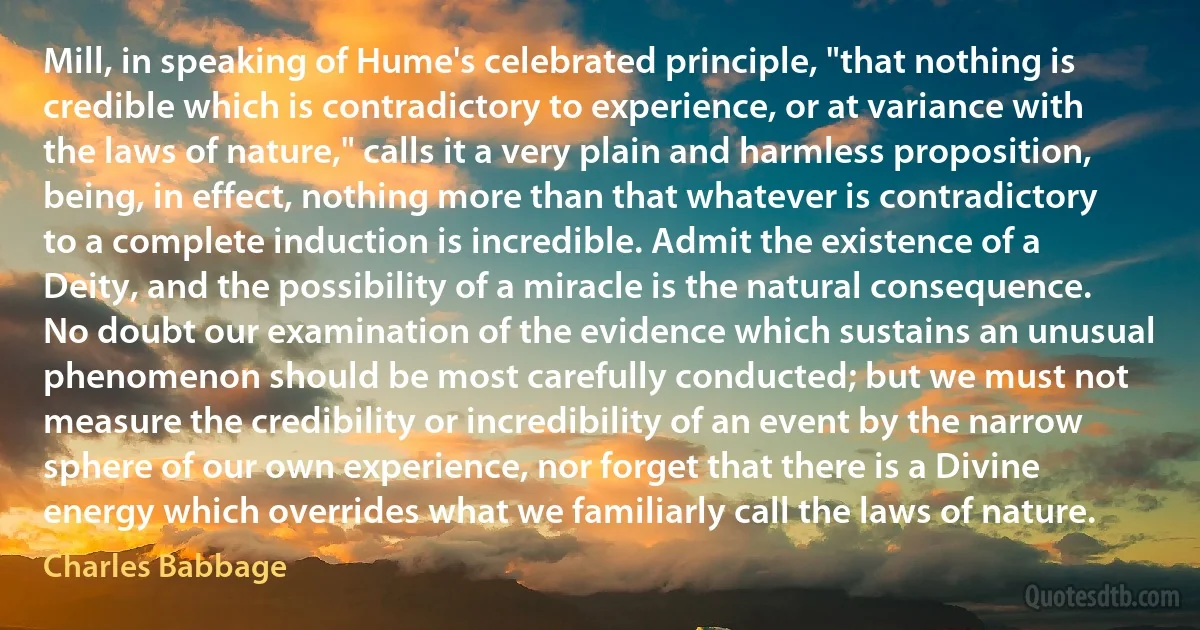
Mill, in speaking of Hume's celebrated principle, "that nothing is credible which is contradictory to experience, or at variance with the laws of nature," calls it a very plain and harmless proposition, being, in effect, nothing more than that whatever is contradictory to a complete induction is incredible. Admit the existence of a Deity, and the possibility of a miracle is the natural consequence. No doubt our examination of the evidence which sustains an unusual phenomenon should be most carefully conducted; but we must not measure the credibility or incredibility of an event by the narrow sphere of our own experience, nor forget that there is a Divine energy which overrides what we familiarly call the laws of nature.
Charles BabbageRelated topics
call contradictory credibility divine doubt experience induction measure mill narrow natural nature nor nothing plain possibility should speaking variance whatever lawsRelated quotes
The danger is that global warming may become self-sustaining, if it has not done so already. The melting of the Arctic and Antarctic ice caps reduces the fraction of solar energy reflected back into space, and so increases the temperature further. Climate change may kill off the Amazon and other rain forests, and so eliminate once one of the main ways in which carbon dioxide is removed from the atmosphere. The rise in sea temperature may trigger the release of large quantities of carbon dioxide, trapped as hydrides on the ocean floor. Both these phenomena would increase the greenhouse effect, and so global warming further. We have to reverse global warming urgently, if we still can.

Stephen Hawking
"I exist" does not follow from "there is a thought now." The fact that a thought occurs at a given moment does not entail that any other thought has occurred at any other moment, still less that there has occurred a series of thoughts sufficient to constitute a single self. As Hume conclusively showed, no one event intrinsically points to any other. We infer the existence of events which we are not actually observing, with the help of general principle. But these principles must be obtained inductively. By mere deduction from what is immediately given we cannot advance a single step beyond. And, consequently, any attempt to base a deductive system on propositions which describe what is immediately given is bound to be a failure.

Alfred Jules Ayer
A kind of second childhood falls on so many men. They trade their violence for the promise of a small increase of life span. In effect, the head of the house becomes the youngest child. And I have searched myself for this possibility with a kind of horror. For I have always lived violently, drunk hugely, eaten too much or not at all, slept around the clock or missed two nights of sleeping, worked too hard and too long in glory, or slobbed for a time in utter laziness. I've lifted, pulled, chopped, climbed, made love with joy and taken my hangovers as a consequence, not as a punishment. I did not want to surrender fierceness for a small gain in yardage. My wife married a man; I saw no reason why she should inherit a baby.

John Steinbeck
We do not mechanically connect the sensation of white with the idea of light, any more than we connect the sensation of black with the idea of darkness. We admit that a black jewel, even if of a dead black, may be more luminous than the white or pink satin of its case. Loving light, we refuse to measure it, and we avoid the geometrical ideas of the focus and the ray, which imply the repetition-contrary to the principle of variety which guides us-of bright planes and sombre intervals in a given direction. Loving colour, we refuse to limit it, and subdued or dazzling, fresh or muddy, we accept all the possibilities contained between the two extreme points of the spectrum, between the cold and the warm tone.

Jean Metzinger
We do not mechanically connect the sensation of white with the idea of light, any more than we connect the sensation of black with the idea of darkness. We admit that a black jewel, even if of a dead black, may be more luminous than the white or pink satin of its case. Loving light, we refuse to measure it, and we avoid the geometrical ideas of the focus and the ray, which imply the repetition-contrary to the principle of variety which guides us-of bright planes and sombre intervals in a given direction. Loving colour, we refuse to limit it, and subdued or dazzling, fresh or muddy, we accept all the possibilities contained between the two extreme points of the spectrum, between the cold and the warm tone.

Albert Gleizes
